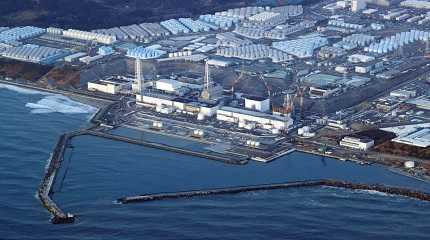
TOKYO, Aug. 18 (Xinhua) -- As the Japanese government approaches a decision on the specific date for the discharge of nuclear-contaminated water from the crippled Fukushima Daiichi Nuclear Power Plant into the ocean, hundreds of Japanese gathered in central Tokyo on Friday to rally against the discharge plan.
Despite scorching temperatures exceeding 35 degrees Celsius, people from various parts of Japan braved the heat to gather in front of the Japanese prime minister's official residence on Friday morning, urging the government to uphold its promise of "no disposal without the understanding of relevant parties."
Hit by a magnitude-9.0 earthquake and an ensuing tsunami on March 11, 2011, the Fukushima Daiichi nuclear power plant suffered core meltdowns that released radiation, resulting in a level-7 nuclear accident, the highest on the International Nuclear and Radiological Event Scale.
The plant has been generating a massive amount of water tainted with radioactive substances from cooling down the nuclear fuel in the reactor buildings, which are now being stored in about 1,000 storage tanks.
Among Friday's protesters was Saeko Uno, who told Xinhua that she started worrying about the nuclear-contaminated water ever since the leak of radioactive substances was reported in 2012.
Traveling all the way from western Japan's Kyoto, she was originally a resident of the capital city of Fukushima Prefecture, who was evacuated to her current dwelling after the earthquake in 2011.
"It is deeply problematic for the government to make a unilateral decision to start the ocean discharge amid opposition from local governments within Japan and concerns of the international community," said Uno, stressing the need for a long-term approach, such as on-land storage.
In 2015, the Japanese government and the Tokyo Electric Power Company (TEPCO), the operator of the plant, made an agreement with fisheries cooperative associations of both Fukushima prefecture and the nation that they will not proceed with any wastewater disposal "without the understanding of relevant parties."
However, the Japanese government announced in April 2021 its controversial plan to release diluted wastewater into the Pacific Ocean and stated in January this year that the discharge will start "in the spring or summer."
Kazuyoshi Sato, co-director of KOREUMI, a Japanese citizens' conference to condemn further pollution of the ocean and one of the rallies' organizers, reiterated the necessity for the government to uphold the 2015 agreement.
"Releasing nuclear-contaminated water into the sea would jeopardize the livelihoods of fishermen, especially when coastal fishing had just begun to recover to around 20 percent of its original levels," he said.
Protesters at the rally handed a petition to the representatives of the Japanese government and TEPCO, demanding adherence to the 2015 agreement, the withdrawal of the ocean discharge plan and comprehensive measures to block groundwater infiltration. They also required addressing the root causes of increased contamination, and reconsideration of alternative options like long-term storage in large tanks and mortar solidification.
Tomoko Abe, a former pediatrician turned member of the House of Representatives, emphasized that the management of radioactive substances has always been about containment and concentration to prevent dispersion.
"It is morally wrong to discard one's waste in another's backyard," she said, arguing that the vastness of the ocean doesn't equate to an absence of impact, particularly when the ocean is shared by everyone.
Friday's gathering was among continuous rallies during the week staged by residents across Japan, calling for the withdrawal of the ocean discharge plan and the exploration of alternative options such as continued on-land storage or other sustainable solutions.
On Thursday, a joint petition signed by 28,627 people in Japan was submitted to representatives of the Ministry of Economy, Trade and Industry jointly by 17 organizations, urging the Japanese government to retract its plan to discharge nuclear-contaminated wastewater into the ocean.
"Once released, there is no turning back. Talking about dilution with seawater is merely a pseudoscientific argument we've heard all too often," a petitioner who goes by the online name of Tsutomu Aihara said.
Local media outlets widely predicted that Prime Minister Fumio Kishida, after returning from his visit to the United States, will convene a cabinet meeting to determine the specific discharge date, which is expected to fall between the end of this month and early September.




